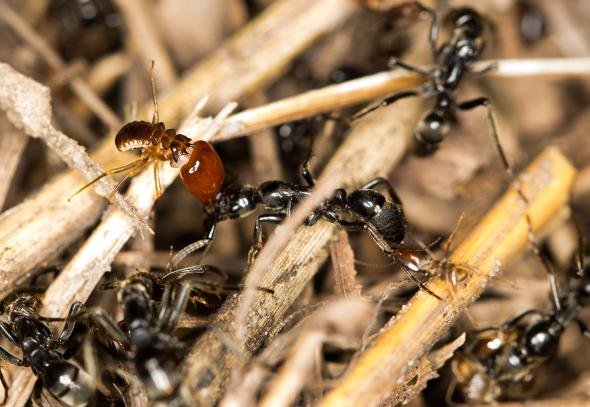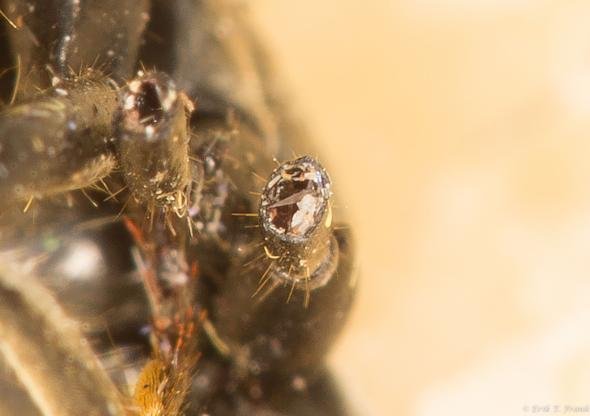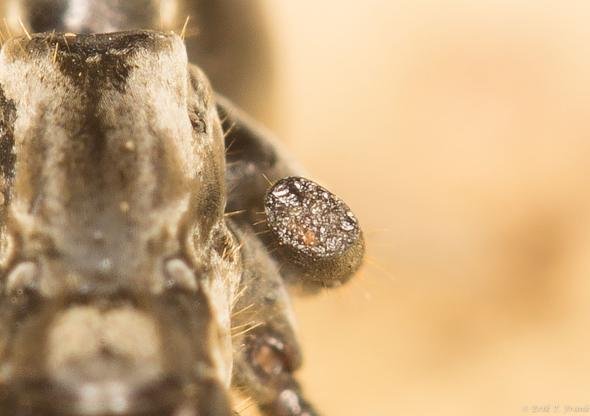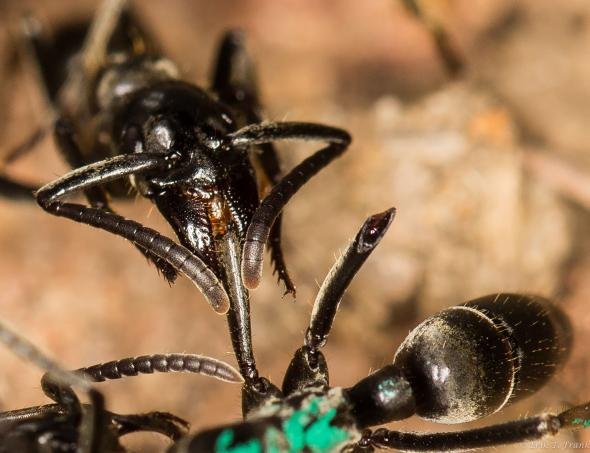'Paramedic' Ants Are the First to Rescue and Heal Their Wounded Comrades
SELF-SACRIFICING ANTS REFUSE TREATMENT OF THEIR WOUNDS A new study reveals that after a raid on a termite nest, the injured ants are cared for by their comrades.
By Christie Wilcox
PUBLISHED FEBRUARY 13, 2018
PUBLISHED FEBRUARY 13, 2018 Matabele ants, native to sub-Saharan Africa, lay siege to the termite colonies they eat by the hundreds, braving the potentially life-threatening bites of large soldier termites that defend them. But what really piqued myrmecologist Erik T. Frank’s interest about these ants was that they carry their wounded home after a raid—a discovery Frank made in 2017.
It turns out their battlefield rescues are just part of the story. Back in the nest, ants take turns caring for their injured comrades, gently holding the hurt limb in place with their mandibles and front legs while intensely “licking” the wound for up to four minutes at a time.
This discovery marks the first time non-human animals have been observed systematically nursing their wounded back to health. Frank and his colleagues describe this behavior in a paper published today in Proceedings of the Royal Society B.
“I did not think the ants would have such a sophisticated treatment of the injured—or that it was actually necessary,” Frank told National Geographic.
The ant on the left treats its injured comrade by holding its hurt limb with its mandibles and front limbs and “licking” the wound.
Frank, who at the time of the research was a Ph.D. student at the University of Würzburg in Germany, wondered what happened to the injured ants once their comrades helped them below ground. Frank and colleagues at the Comoé National Park Research Station in northeastern Côte d'Ivoire created artificial nests topped with a clear cover so an infrared camera could capture the action inside.
They saw that once in the nest, the ants carefully examine injured comrades, probing them with their antennae more than twice as often as healthy nest-mates.
This behavior proved vital: 80 percent of experimentally injured ants died within 24 hours if kept by themselves. But if cared for by their nest-mates for even an hour, only a tenth died. Interestingly, 80 percent survived without treatment if placed in a sterile environment, so Frank believes infections are the main cause of death and this “licking” behavior may help prevent them.
While animals have frequently been observed treating their own wounds, there were only a few anecdotes of animals treating one another prior to this discovery, including an instance of a captive capuchin monkey tending to her infant’s head wound.
BATTLEFIELD TRIAGE
In his earlier work, Frank discovered that injured ants release a pheromone that acts like a signal flare, alerting the raiders that there’s a man down. But this time, he noticed another strategy: playing up their injuries. When no help was in sight, injured ants made a beeline for the nest. But when nest-mates were near, they stumbled and fell, appearing “more injured” as a way to attract aid.
Ants only did this if their injuries were not life-threatening. Mortally wounded ants—ones where Frank removed five legs instead of two—were mostly left to die by raiding parties in field and lab experiments. Such triage makes sense, as it ensures ants don’t waste their resources caring for lost causes; the injured that recover continue to raid, despite their lost limbs. Frank found they comprised more than a fifth of the raiding party even though they’re only five percent of the total colony.
The ant in the middle has termite soldiers clinging to its head and hind leg during a raid.
https://news.nationalgeographic.com/content/dam/news/2018/02/13/ant-triage-heal/05-ant-heal-
triage.ngsversion.1518477359263.adapt.676.1.jpg
Researchers observed ants’ raid on termites in the lab by placing the termites in a mound of grass.

This fresh wound on this ant’s would likely be cared for by a healthy ant back in the nest.

The end of a different ant’s injured limb has formed a whitish crust sealing off its wound.
Even when Frank doused the injured ants with the rescue pheromone, their comrades still left them behind. Careful video analysis revealed why: It wasn’t that the healthy ants refused to rescue the gravely injured ants. The dying ants refused to cooperate, flailing their legs around when probed or picked up, forcing their helpers to abandon them. This surprised him.
“In humans in cases were a triage system is necessary, the decision [about] who will receive help is made by the doctor: a top-down regulated system,” Frank noted. “In the ants it's exactly the opposite.”
Helen McCreery, a postdoctoral fellow at Michigan State University who studies social behaviors in ants, found the paper exciting, even though the behavior makes evolutionary sense. “What's the point in rescuing your nest-mate if they won't survive anyway?” she asked. “Still, when I read that they bring wounded ants home, I didn't imagine they would treat the wounds.”
There’s a lot left to learn about why, when, and how social insects may try to rescue one another, she said. “It's quite likely that there are other ant species, or other social insects, that tend to their wounded.”
And that’s something Frank, now a postdoctoral fellow at University of Lausanne in Switzerland, is looking into. If other ants perform similar rescuing behaviors, he wants to know. He also plans to study these ants further to see whether the nursing behavior prevents infections or actually treats them, as the ants could be a novel source of antibiotics.
Christie Wilcox, Ph.D., is a science writer and author obsessed with nature’s underdogs and villains. Follow her on Twitter, Facebook, and her website.
This article was copied from: nationalgeographic.com

Ants give us several lessons that we must take advantage of
A lot of animals do so, not just ants
Wonderful and continued @Mohamed-shebl
thanks man
Hi! I am a robot. I just upvoted you! I found similar content that readers might be interested in:
https://news.nationalgeographic.com/2018/02/matabele-ants-rescue-heal-injured-soldiers/
Wow that is amazing i did not know ants did that! By the way i just made a post about FOMO. You should check it out :-)
mayteen shakl ebnel a7ba ely katablak tany da :D
informative post . appreciated @mohamed-sheb
Fascinating stuff! Really interesting :)
Spiders is amazing! Nice post!